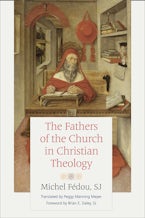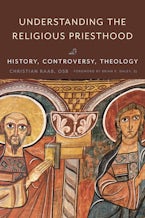Preparing your PDF for download...
There was a problem with your download, please contact the server administrator.
The Fathers of the Church in Christian Theology
by Michel Fédou
Foreword by Brian E. Daley
Translated by Peggy Manning Meyer
Imprint: Catholic University of America Press
The main purpose of The Fathers of the Church in Christian Theology is to argue that Patristic studies still has much to contribute to theological reflections in our time. Throughout history, the reading of the Fathers of the Church has made major contributions to Christian thinking. This fecundity was notably verified in the 20th century through the work of theologians like Henri de Lubac and Hans Urs von Balthasar. It was as well manifested broadly in the life of the church that, with the Vatican II council, drew from the patristic tradition a source of inspiration for its own renewal.
However, even though the research and work on early Christianity has experienced considerable growth for several decades, Christian theology is today confronted with new questions. Thus, what status to recognize in the exegesis of the Fathers? Has not the distance from the heritage of patristic thinking been widened? More radically, do not the demands of contextual theologies on diverse continents compel a distancing away from some traditions that formerly were principally limited to Mediterranean and European regions?
If these questions must be taken into account, they, nevertheless, cannot dispense with Christian theology being, today as yesterday, inspired and made fecund by the writings of the Fathers. Michel Fédou attempts to shed light on what, in our own era, justifies the necessity of a patristic theology. He shows how the reading of the Fathers contributes to the understanding of the faith in the different fields of Christian thinking. It highlights the importance of their writings for the spiritual life and the valuable nourishment that they thus offer to our times.
Michel Fedou, SJ is professor of Patristics and Dogmatic Theology at the Centre Sevres - Facultes jesuites de Paris.
"A loving tribute to patristic theology and its significance for contemporary theology…Not many books like this exist in English, and it deserves to find an audience."
~Joseph T. Lienhard, SJ, Fordham University
"The riches of French patristic scholarship are on full view in this lucid and passionately argued book. With a deep awareness of the past and constant reference to the present, Père Fédou points the way toward a fresh application of the heritage of the Fathers—their ‘miraculous’ enlightenment and nourishment of faith—to contemporary problems of theology and Christian life."
~William E. Klingshirn, Director, Center for the Study of Early Christianity, The Catholic University of America
"As application of social sciences and critique to their works gains increased attention, Michel Fédou makes a strong case for treating the Fathers of the Church as sources for theology. He shows the determinative influence of early Christian writers on Vatican II and the renewal of theology in the twentieth century. While systematic accounts of Christian faith become preoccupied with contemporary cultural and intellectual developments, Fédou effectively reminds us of these early authors’ continuing fecundity for theology’s understanding of God and the world."
~Joseph G. Mueller, SJ, Marquette University
"This book has no real parallels...a magnificent achievement and it places all of us in Fedou's debt."
~Thomist


